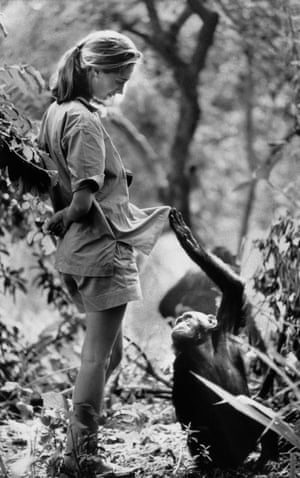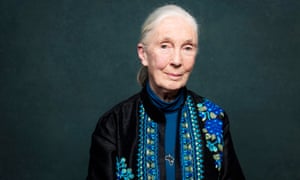The primatologist and ecological activist on why population isn’t the cause of climate change, and why she’s encouraging optimism
Jane Goodall is a primatologist who is regarded as one of the world’s leading authorities on chimpanzees. She has spent 60 years studying the chimps that live in the Gombe Stream national park and she is a prominent advocate, via several foundations, of protecting the great apes and their habitats. She has been presented with awards by the UN and various governments for her conservation and environmental work. She appears in the Netflix documentary The Beginning of Life 2.
You warned last June that humanity will be finished
if we don’t make drastic changes in response to the coronavirus
pandemic and the climate crisis. Have you seen any indication of that
drastic change?
The window is closing. Business as usual –
using up natural resources faster and faster – can’t carry on. In some
cases, we are already using resources faster than they can be
replenished. And we can see the consequences. Look at climate change. It
is not something that might happen in the future; we are already seeing
terrible hurricanes and floods and fires. It is building up into an
inferno. When you think globally like that, it is very, very depressing.
Do you feel that the pandemic has shifted perceptions, or created more of a sense of urgency?
Maybe
Covid has given a push that will make a difference. The most important
lesson from this pandemic is that we need a new relationship with nature
and animals. Our disrespect for animals creates conditions for the
emergence of zoonotic diseases. You can see that same disrespect in factory farms, bushmeat and wildlife markets and the illegal wildlife trade. About 75% of all newly emerged diseases in humans are zoonotic.
What more needs to be done?
We need to move to a
more sustainable relationship with the natural world. We need a greener
economy. If countries move away from fossil fuels and subsidise clean,
green energy that will create a lot of jobs. If you plant trees in a
city it has enormous benefits – it cools the temperature, cleans the
air, stabilises the soil against flooding and improves psychological and
physical health, to mention only a few. We also need to cut down on
waste. I grew up in the war, when food was rationed and you did not
throw anything out. We need to value food more – as aboriginal people
do.

Do you think politicians and the public are focused enough on this challenge?
As
damage is coming to a peak, awareness is coming to a peak. But it does
not help to focus exclusively on the problems. Yes, the media must point
out the harm we are inflicting. But they should give more space to all
the amazing restoration programmes happening around the world – that
gives people hope and they are more likely to do their bit. If you lose
hope, why bother?
Change is happening. Millions are switching to wind and solar energy, clearing up streams or picking up rubbish. Consumers are influencing the way business does its work. I am always meeting amazing people doing great projects to allow biodiversity to creep back. A lot of it in China. There are many different ways to start moving in the right way.
How about at the national and international level? The Global Biodiversity Outlook 5 report found the international community did not fully achieve any of the 20 Aichi biodiversity targets agreed in Japan in 2010 to slow the loss of the natural world. Can we expect anything better at the next big UN biodiversity meeting in Kunming, China, next year?
All
I have seen, to be honest, is more decision makers talking about change
and making plans, but not doing enough to make it happen. At these big
meetings, there is so much talk and so little follow-up action. But now
we are seeing more action among the youth. Children are standing up and
influencing their parents, business leaders and politicians. Voting, in
democracies, can make a big difference.
You and David Attenborough both appear to be more active than ever. But has your approach changed?
You have tended to focus on individual responsibility in the past. Is
it now time for something more radical, for system change?
I
think we need many different approaches. There are instances when
violent tactics are necessary to make people aware - like the
anti-slavery movement. But violence can be counterproductive. I think
people must change from within. If children point at dominant males and
say “you are bad and we demand that you change”, the response may well
be “I won’t be lectured by a young person”. My way is to tell stories,
trying to reach the heart. Too often people give lip service to change
but carry on with business as usual.
Our organisation, Roots & Shoots, works at the grassroots level with youth. The movement is growing very fast - all over North and South America, Africa, Europe and Asia, including over 1,000 groups in China. There are also new groups in the Middle East. Turkey and Israel, and I want to spread it further. We are linking youth from different countries together and finding partner organisations. It is really important to grow as the programme is giving young people hope. This is needed badly as we have caused so much environmental damage since we began in 1991. And without hope youth falls into apathy and does nothing. Many of of the early Roots & Shoots members are now in leadership positions.
We're seeing the consequences of the idea that there can be unlimited economic development with finite natural resources
But this is not just a matter of changing individual behaviour. Aren’t there are deeper causes in the way the global economy is organised?
We
are seeing the consequences of the crazy idea that there can be
unlimited economic development on a planet with finite natural resources
and a growing population. Decisions are made for short-term gain at the
expense of protecting the environment for the future. Now, the world’s
population is estimated at over 7 billion people and it is expected to
be closer to 10 billion by 2050. If we carry on with business as usual
what is going to happen? To be clear, the main problem is not population
growth. I have never said that, although George Monbiot claims that I did,
which is disappointing because I have always admired him. It is one of
three main problems – the other two are our greedy lifestyle, our
reckless burning of fossil fuels, the demand for meat, poverty – and, of
course, we must also tackle corruption.
We have to eliminate poverty. Because if people are really poor, they will destroy the environment because they have to feed themselves and their families. In 1990, I flew over Gombe national park [in Tanzania] and I was shocked to see the change. During the 1960s, it had been part of a vast equatorial forest. By 1990, Gombe was just a little island of trees, surrounded by land that had been stripped bare. It was then that I realised unless we could help people make a living without destroying their environment we couldn’t save chimps or forests. So we helped in many ways including providing scholarships for girls and offering microcredit opportunities, especially to women. It’s worked. If you fly over Gombe today, you don’t see those bare hills; the forest has come back. As women’s education improves, family sizes tend to drop. Women want to educate children. They don’t want to be birth machines.
In the Netflix documentary The Beginning of Life 2,
you and many other biologists, conservationists and psychologists
stress the mental health and social benefits that can come from a close
connection to the natural world, and warn of the dangers that this is
being lost among a younger, more urban generation.
When I
was growing up, we did not even have television, so we immersed
ourselves in books and nature. Children today have less time for that
because they are fascinated by iPhones, laptops and video games. Also
many more children grow up in cities, surrounded by concrete. The
important thing is to get them into nature – the younger the better. In
the documentary, you see the expression of wonder on a child’s face – a
three-year-old boy watching a snail glide along. He suddenly picked it
up, ran and put it on a window pane to watch it from the other side.
This kind of experience is very, very important. It is only when you
care for nature that you protect it. The film is very inspiring.
How has lockdown affected people’s relationship with nature?
In
some cases, it has meant closer contact, but that depends on whether
people have a garden or live near parks or green areas where they can
walk. So many poor people were confined to the concrete jungle.
And how has it affected you?
I miss the contact
with people, my friends. But I have adapted. I used to be travelling 300
days a year and meeting people face to face. Since I have been in
lockdown, I do everything virtually and have reached millions more
people in many more countries. So there is a silver lining. I try to
find the silver lining in everything. We mustn’t lose hope.
Anything you would like to add?
You remind me of my favourite chimp, David Greybeard.

No comments:
Post a Comment